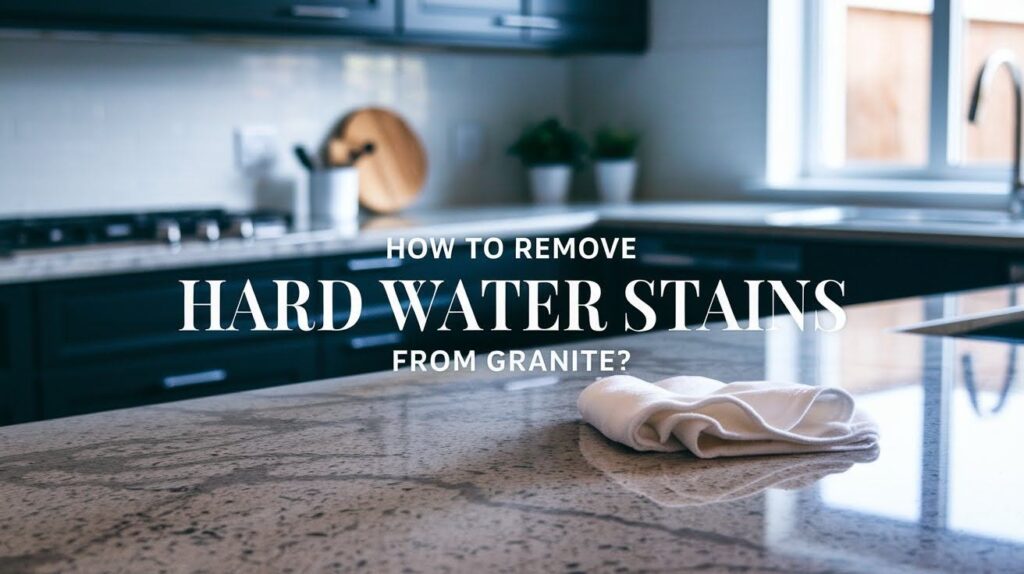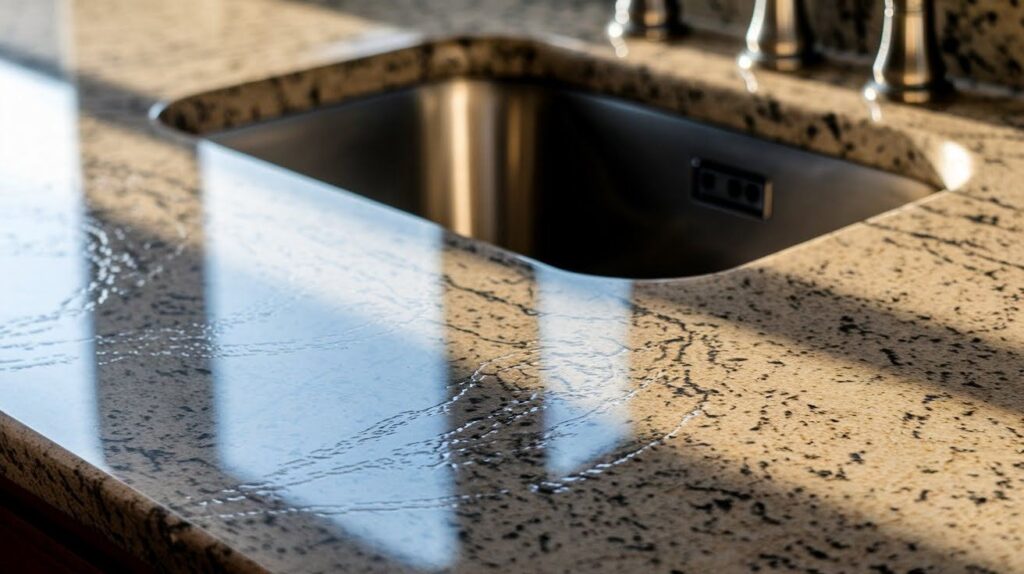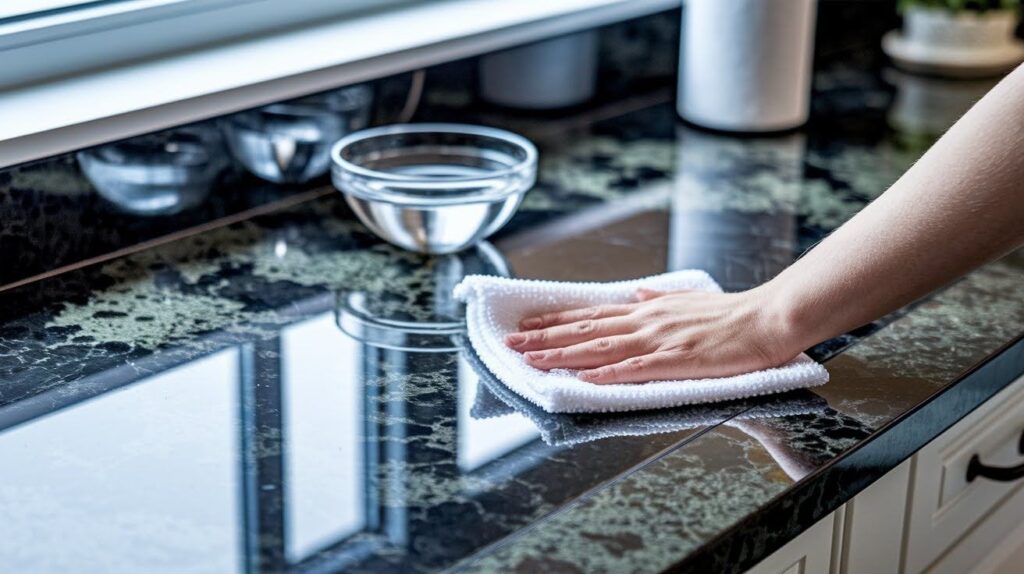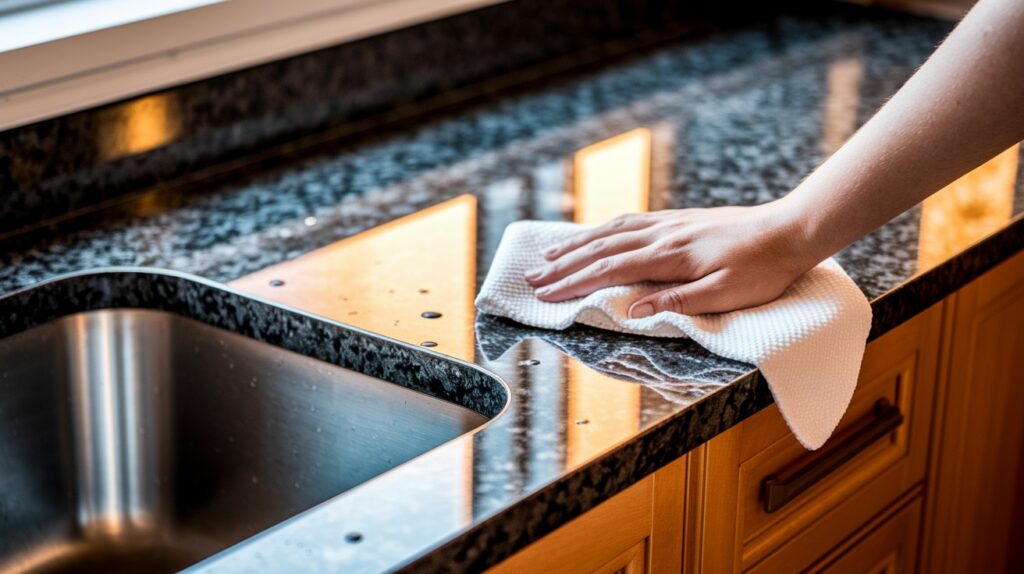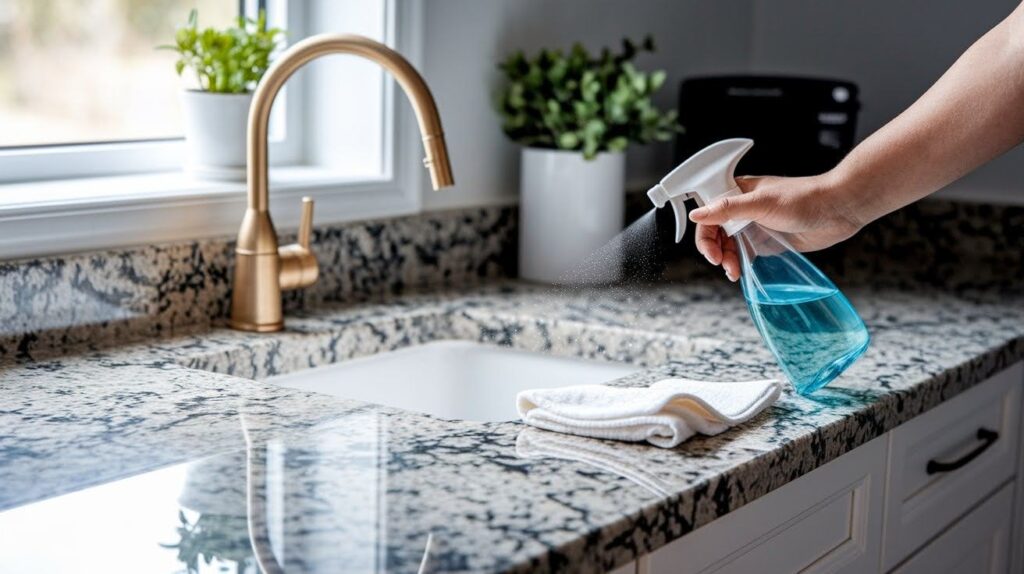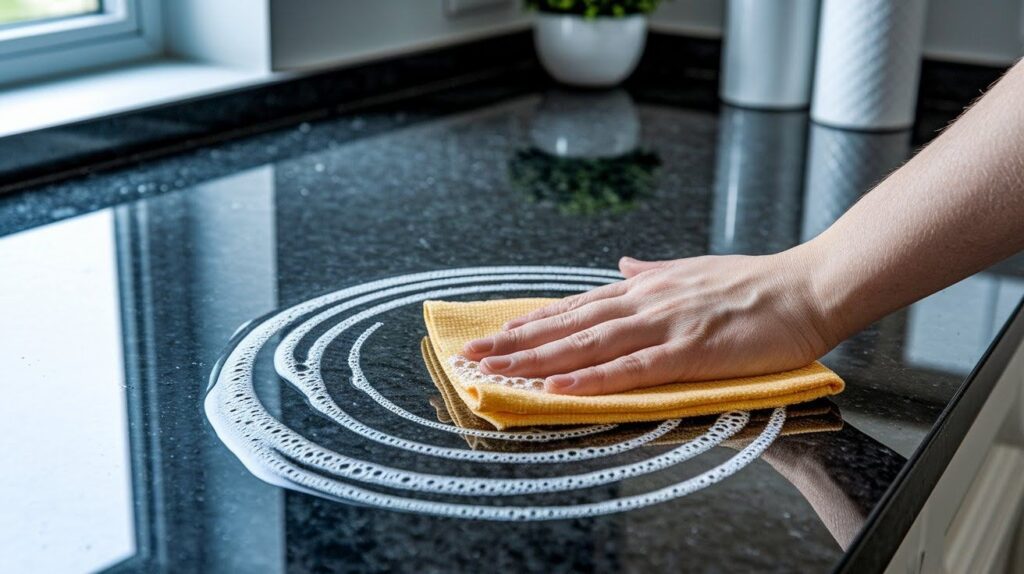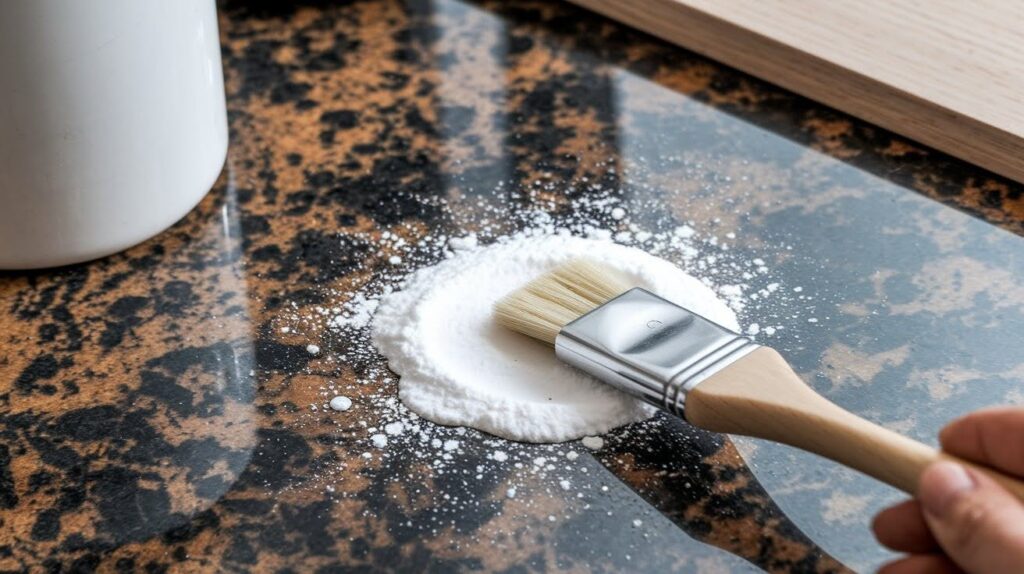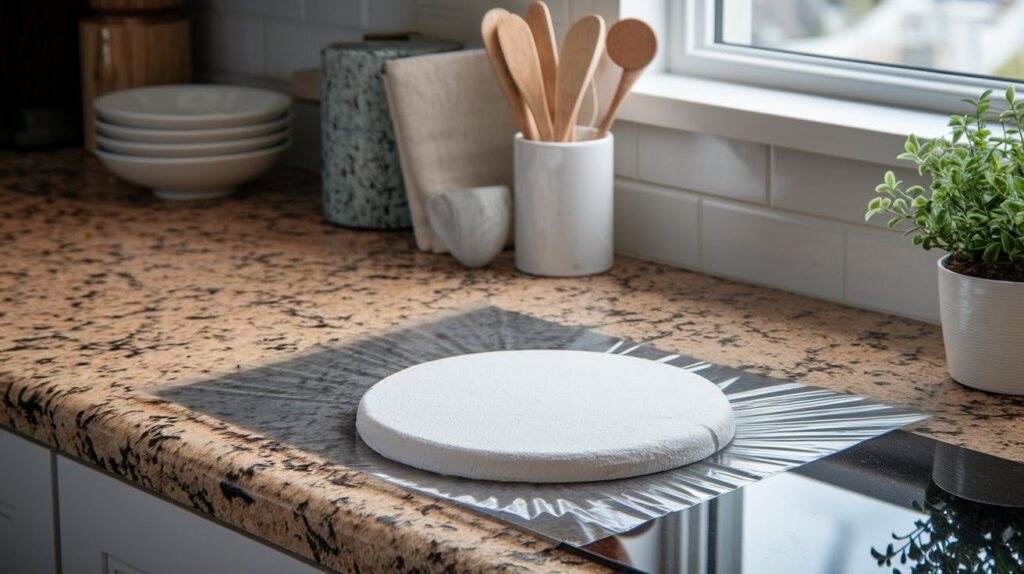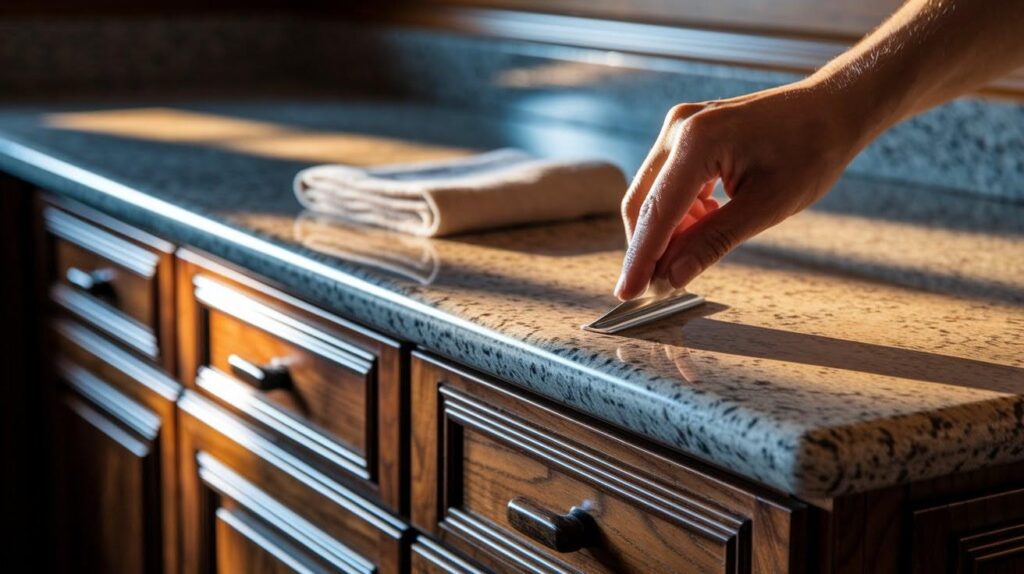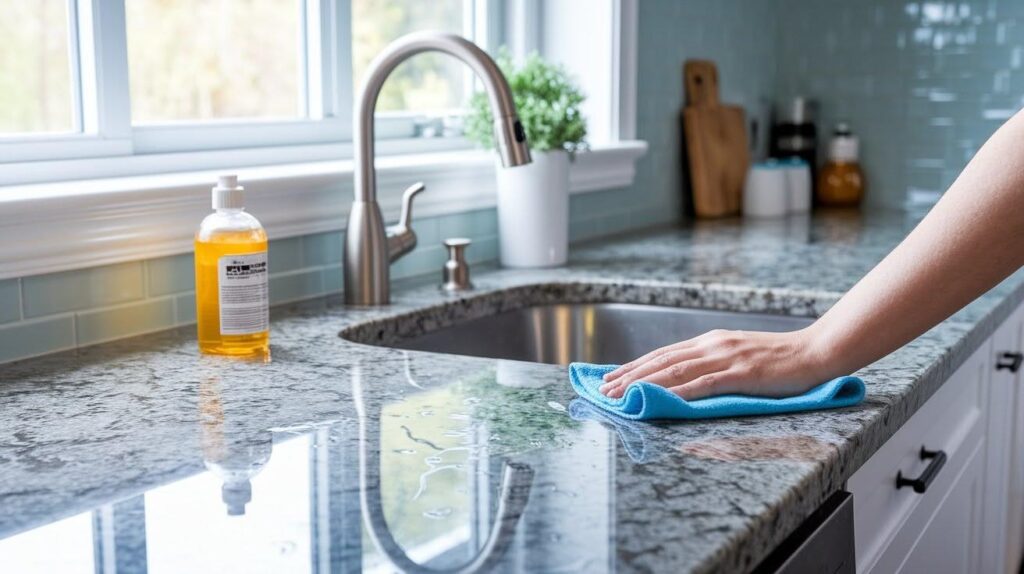Granite countertops are tough, so heat and water damage can affect them. Are those cloudy white spots and rings what you see now? Hard water causes mineral buildup inside.
You will be able to save more money, and you can keep your counters looking just great if you then learn how to remove hard water stains from the granite. This skill’s acquisition helps.
I’ll show you cleaning techniques proven to work without damage to your stone. You will learn how to differentiate simple water spots from the stubborn hard water stains that need special treatment.
Some simple prevention tips appear in this guide. It also covers a few DIY cleaning solutions. Let us get your granite a look to be clean again.
What Causes Hard Water Stains on Granite?
Hard water stains happen when minerals like calcium and magnesium evaporate and leave residue behind.
When water sits on your granite and dries, these minerals stay put as white or cloudy marks. Your location determines how bad the problem gets.
Areas with limestone bedrock or well water have higher mineral content and more staining issues.
Certain spots get hit harder, especially around kitchen sinks, faucet bases, and anywhere you leave wet dishes or glasses. The longer water sits on unsealed granite, the worse the staining becomes.
Can Granite Be Damaged by Cleaning?
Yes, granite can be damaged if you use the wrong cleaning products. Vinegar, lemon juice, ammonia, and bleach are too acidic and will etch the stone’s surface. These acids break down the sealant and can permanently damage your countertop’s finish.
Sealant acts as a protective barrier on your granite. It fills the stone’s pores and prevents liquids from soaking in.
Harsh chemicals strip this layer away, leaving your granite vulnerable to staining and etching. You should reseal your counters every one to two years.
Stick to pH-neutral cleaners made for stone. Dish soap mixed with warm water works for daily cleaning.
Baking soda is safe for tougher stains. Always check labels for “safe for natural stone” before using any product on your granite.
Step-by-Step Guide to Removing Hard Water Stains
Follow these six proven methods to remove hard water stains from granite, starting with gentle cleaning and progressing to stronger treatments as needed.
Step 1: Wipe Spills Immediately
Keep a microfiber cloth near your sink and dry the counter after each use. This simple habit stops minerals from settling into the stone before they become a problem.
Step 2: Use a Granite-Safe Cleaner
Specialized stone cleaners work better than dish soap, which can leave a film that attracts more mineral deposits. Spray stone cleaner on your counter and wipe with a soft cloth daily in high-use areas.
Step 3: Treat Early Water Spots
Fresh water spots and faint white rings are easier to remove. Dampen a cloth with warm water and a few drops of dish soap. Wipe the spot in circular motions, then rinse and dry completely.
Step 4: Apply a Baking Soda Paste
Mix three parts baking soda with one part water to make a thick paste. Spread it over the stain and let it sit for a few hours. Gently scrub with a soft-bristled brush in small circles, then rinse and dry.
Step 5: Try a Poultice for Stubborn Stains
For deep stains, mix baking soda with water to create a thick consistency. Spread a quarter-inch layer over the stain and cover with plastic wrap. Leave it for 24 hours to draw out minerals. Remove the plastic, let it dry, scrape off gently, and wipe clean. Repeat if needed.
Step 6: Carefully Use a Razor Blade (Last Resort)
For thick mineral buildup, hold a razor blade at a shallow angle and scrape in one direction with light pressure. Work slowly to avoid damaging the sealant. Clean the area with stone-safe cleaner and reseal if necessary.
How to Prevent Hard Water Stains on Granite
Regular Cleaning Habits
Wipe up water spills immediately and dry counters after doing dishes. Use stone-safe cleaner weekly, focusing on areas near sinks and faucets where water sits frequently.
Sealing Your Granite
Sealing stops water and minerals from soaking into the stone. Reseal every one to two years, or annually for heavy-use kitchens. Test by placing water drops on your counter for 15 minutes. If water soaks in, reseal immediately.
Professional Protection Options
Stone care experts use commercial-grade sealants that last longer. Call a professional if staining persists despite regular cleaning or if you have damage from acidic cleaners.
Tips for Maintaining a Spotless Granite Countertop
- Dry your counters thoroughly after every cleaning: Water left behind evaporates and leaves mineral deposits that become stains over time.
- Place coasters under all glasses and wet dishes: Condensation from cold drinks creates water rings that mark unsealed or worn granite surfaces.
- Avoid abrasive pads and harsh chemicals: Steel wool and acidic cleaners damage both the sealant and stone. Use soft cloths and pH-neutral products only.
- Keep stone-safe cleaner nearby: Having the right product on hand makes weekly maintenance simple and prevents buildup from forming.
- Reseal at least once a year: Set a calendar reminder for this important step. High-traffic kitchens may need resealing more frequently.
Conclusion
You now know how to keep hard water stains from coming back and how to remove them from granite.
For stubborn marks, move to poultices, start with gentle methods like baking soda paste, also always dry counters. All of the difference is made by consistent and constant care.
Your beautiful countertops should not be ruined now. Buildup of minerals can cause damage. Reach out to a stone care professional in the event that your sealant needs some attention or in the event that stains won’t budge.
A maintenance plan is what will be set up as they restore your granite. What granite care challenge do you face most often? Write in the space below.
Frequently Asked Questions
Can I use vinegar to remove hard water stains from granite?
No, vinegar is too acidic and will damage your granite’s sealant and etch the stone. Use baking soda paste or pH-neutral stone cleaner instead.
How often should I seal my granite countertops?
Seal your granite every one to two years. Test every six months by placing water drops on the surface for 15 minutes.
What’s the white cloudy film on my granite countertop?
That’s mineral buildup from evaporated hard water containing calcium and magnesium. Remove it with a baking soda paste or a poultice treatment.
Will hard water stains permanently damage my granite?
Surface stains won’t cause permanent damage if treated promptly. Repeated exposure without sealing allows deeper penetration that’s harder to remove.
Can I prevent hard water stains on granite completely?
Wipe spills immediately, keep granite properly sealed, and use coasters under glasses. Regular maintenance prevents most mineral buildup.

